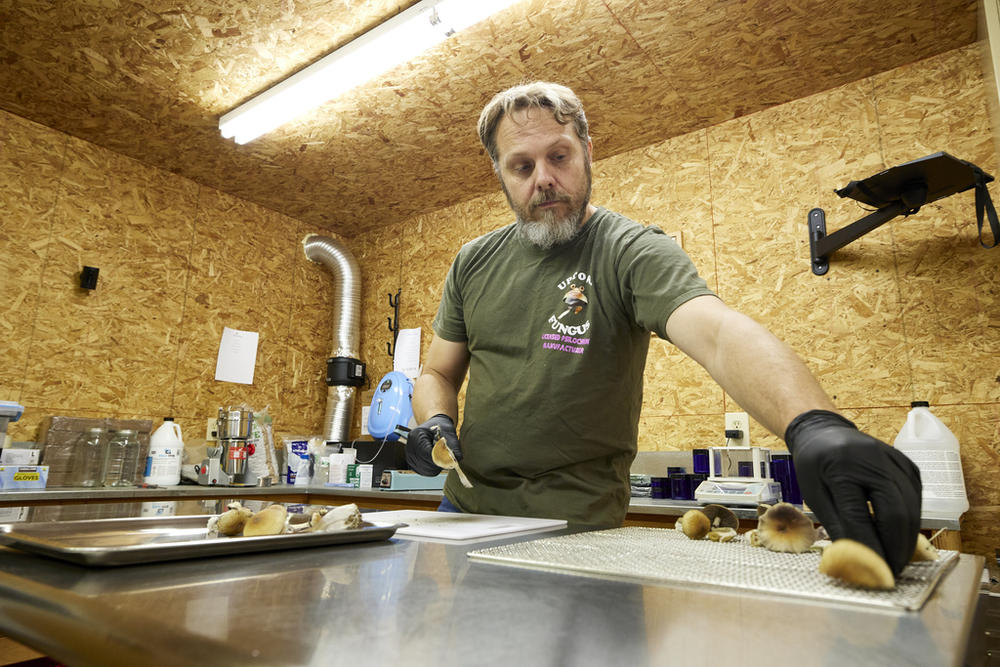
Caption
Gared Hansen cuts psilocybin mushrooms in his Uptown Fungus lab to prepare for distribution in Springfield, Ore., Monday, Aug. 14, 2023.
Credit: (AP Photo/Craig Mitchelldyer)
LISTEN: A new study from Emory University shows psilocybin-assisted therapy, could help treat more than 5 million Americans experiencing mental illness, if approved by the U.S. Food and Drug Administration. GPB’s Ellen Eldridge has more.

Gared Hansen cuts psilocybin mushrooms in his Uptown Fungus lab to prepare for distribution in Springfield, Ore., Monday, Aug. 14, 2023.
Psilocybin is the active hallucinogen in so-called “magic mushrooms,” and the substance has helped treat people experiencing Major Depressive Disorder (MDD) and Treatment-Resistant Depression (TRD) in clinical trials.
Psilocybin currently has a breakthrough designation with the U.S. Food and Drug Administration, meaning that it will expedite a review of the Phase III clinical trial results because of its potential as a therapeutic for depression, Fayzan Rab, an M.D. candidate and psychedelic researcher with Emory University’s Center for Psychedelics and Spirituality (ECPS) said.
“Psychedelic drugs show initial promise as potential treatments for mood, anxiety and substance use disorders, Dr. Tiffany Farchione, director of the Division of Psychiatry in the FDA’s Center for Drug Evaluation and Research said. “However, these are still investigational products. Sponsors evaluating the therapeutic potential of these drugs should consider their unique characteristics when designing clinical studies."
By publishing this draft guidance, the FDA hoped to outline the challenges inherent in designing psychedelic drug development programs and provide information on how to address these challenges, Farchione said, with the goal of helping researchers design studies that will yield interpretable results that will be capable of supporting future drug applications.
A study led by Rab estimates that more than 5 million people could find relief with psilocybin-assisted treatment.
“What is really timely about this research is that it provides a data-driven number that is interpretable to the FDA,” Rab said. “This is how many Americans we think are at stake. I think that will be a meaningful estimate for the FDA to weigh when they consider whether to approve psilocybin for therapeutic use.”
His analysis depicts the public health demand and economic impact based on medical eligibility.
"To date, there really hasn't been a really good data-driven number that would be defensible to give any public health agency, whether that's the FDA or a major payer like Medicare or Medicaid, in terms of this is the number of people we think could actually really benefit from this if, you know, if the other barriers to care were kind of removed," Rab said.
Almost 20% of the 85 million Medicaid beneficiaries — or 17 million people — are likely to have clinical depression. Therefore, the conditions under which Medicaid might or might not reimburse for psilocybin-assisted therapy will determine the demand.
While Rab is not involved with clinical trials, he said he believes some of that shadow that has been over the psychedelics research space is starting to diminish, and studies are being conducted in a scientific and rigorous way.
Past clinical trials studying the efficacy of psilocybin indicate that just one singular 25 mg dose of psilocybin is often enough to reduce symptoms of depression — potentially decreasing the financial burden on insurance payers currently funding other interventions.
"I do think that this is something that we should start to get at least curious about or excited about and study more deeply, but hopefully be something that, you know, would be able to treat a number of Georgians with mental illness that currently don't have really good modalities for care," he said.